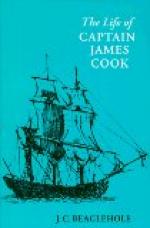for the position to be occupied by the cats, and Wolfe
refers in a despatch to a conversation he had with
Cook upon the matter. The attack took place on
31st July, aided by the fire of the Pembroke, Trent,
and Richmond, which were “anchored clear over
to the north shore before Beauport, a brisk firing
on both sides,” but the boats were thrown into
confusion by a reef (marked on the chart as visible
at low water), and were some time before they could
effect a landing, then a heavy storm of rain came on,
rendering the ground, which was steep, very slippery.
The troops occupied one redoubt, but were so dominated
by the French musketry that they could get no further,
and Wolfe deemed it desirable to recall them and to
stop the advance across the ford. The two cats
were burnt to prevent them falling into the hands
of the enemy, and the losses of the English in killed,
wounded, and missing were 443, those of the French
being estimated at 200. Cook says the repulse
was solely owing to the heavy fire from the entrenchments,
“which soon obliged our Troops to retreat back
to the Boats and Montmorency”; whilst Wolfe,
in a general order, throws the blame on the Louisburg
Grenadiers, a picked body of men from several regiments,
whom he considers got out of hand. He also, in
a despatch submitted to Saunders, threw some amount
of blame on the Navy, but to this the Admiral strongly
objected, and it was withdrawn, Wolfe saying:
“I see clearly wherein I have been deficient;
and think a little more or less blame to a man that
must necessarily be ruined, of little or no consequence.”
It has been asserted that Cook led the boats to the
attack, but as this was done by Wolfe himself, according
to his own letters, and as Saunders was also out with
them, both officers having narrow escapes, it seems
more probable that Cook would be on his own ship, where,
as she was engaged, his services would be wanted,
for it was one of the Master’s most important
duties to work her under the Captain’s orders
when in action.
A few days before this attack on Beauport was made,
the French again paid the fleet the undesired attention
of a large fire raft composed of several small vessels
chained together and laden with all sorts of combustibles—shells,
guns loaded to the muzzle, tar barrels, etc.,
and again this was grappled by the boats and towed
away to a place of safety; and then Wolfe, sending
in a flag of truce the next morning, said that if
the performance were repeated he should cause the instrument
of destruction to be towed alongside two ships in
which he had Canadian prisoners, and there let it
do its worst. This somewhat cold-blooded threat
was sufficient, and the experiment was not repeated.
A narrow escape.




